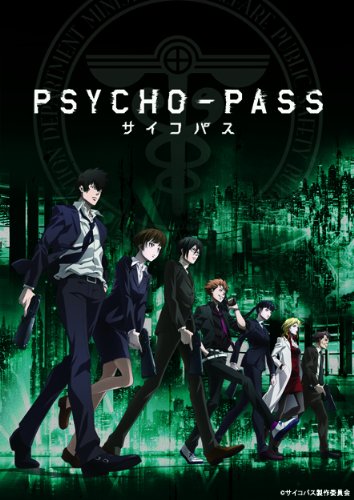My brother recommended the anime Psycho-Pass to me. Things I watch with my brother tend to be hit or miss; even though he's a real film buff, we never end up watching Fellini or Godard together; we usually end up seeing something like The Hobbit: the Desolation of Smaug, which is fine, but ultimately slightly unsatisfying.
According to official nerd lorekeepers,
it's "smOWg," not "smAHg."
While I did enjoy seeing It Follows (the best horror film about a sexually-transmitted, slow-moving, partially invisible, relentless murder demon you will ever see, even if the Disasterpiece soundtrack made me feel like I left Kavinsky's 1984 on repeat and too loud), Psycho-Pass is back to the usual "not horrible, but not better than average."

There is no "business casual" in the future.
The setting is in a future Japan in a new state of Tokugawa era-style isolation, where society is controlled by a personality-reading supercomputer system called Sybil (possibly an abbreviation, definitely a reference to the oracle). The following things are true in this future Japan:
- The Sybil system can determine your mood and propensity for criminality through its nationwide network of surveillance cameras.
- If your mood and/or criminality are aberrant, Sybil sends the mental health cops out to involuntarily commit you to a mental institution (often indefinitely).
- The cops have guns that kind of make them like the Sandmen from Logan’s Run.
In Psycho-Pass, they're called "Dominators," because (sarcasm) that's not fascist at all. The guns don’t fire unless Sybil decides the gun is pointing at a criminal, at which point the gun generally unlocks to a stun mode. If the target’s criminal rating gets really high, Sybil unilaterally switches the cops’ guns from “stun” to “grotesquely murder.” There’s also a “vaporize with plasma” feature that I am pretty sure the writers did not come up with consistent rules for; it shows up twice and then is never heard from again.A Sandman, for reference. I liked the selective-fire chambers of the Gun in the book better. 
The "dominator" in "someone's about to explode like Deacon Frost/La Magra at the end of the first Blade film" mode. - The cops are mostly “latent criminals” who get to not be institutionalized all day in return for stunning and/or grotesquely murdering other folks who set off alarms. They are supervised by a small cadre of supposedly psychologically healthy people, but apparently hanging around "latent criminals" whose job it is to explode their fellow citizens in a shower of blood tends to push the supervisors towards latent criminality themselves, so for some it's a small slip from supervisor to supervised.
- Japan is still a place where, after weeks of running around with a firearm chasing fugitives, a young professional woman will still continue to wear a pencil skirt as her primary criminal-chasing outfit. Look, I get it, there's a slit in the back so the wearer isn't mincing everywhere. But it's not really designed for one to sprint all over the place, which is what the job entails.

Look at this skirt that Akane is always in. Just try to imagine being in that skirt and running up and down all the stairs that are in this show. And yet, pants are verboten for the whole season. It’s like pants are reserved for the lesbian cop (who is a latent criminal, as most of the show’s lesbians are either latent criminals or outright criminals). Stay classy, Japan.
The show starts out following a group of mental health cops as they find their way onto the trail of a sort of Moriarity of future crime, a puppet-master who aids the disturbed in committing really sick crimes and getting away with them. He has hair borrowed from Berzerk’s Griffith (that’s how you know he’s truly evil, bishounen with long white hair are always really evil).
 |
| "I feel pretty! Oh so pretty!" I was considering putting in one of the available images of the guy above murdering one of the various people he kills with a straight razor, but hey, let me just put it down here - this guy is more violent with a straight razor than Sweeney Todd and he's not the sickest murderer in the show. |
This first part is entertainingly diverting in a police procedural way, although the crimes tend to be aiming toward maximum squickness factor. If you like watching Law & Order:SVU, you should be OK.
Then, about halfway through, someone involved in writing the plot realized, “hey, wait, a society where a nigh-omniscient supercomputer determines your destiny and then sends the Sandmen after you if you get stressed out about it is really screwed up,” and suddenly everyone, good and evil, is engaged in a much larger struggle against the system itself, which is also entertaining, but if you were really getting into the police procedural part, you might be thinking, “how did I end up in something that feels like a book in the Divergent series?”
 |
| At least Tris gets to wear pants in the supercomputer room. Akane does not. And there are many, many stairs up and down to the supercomputer room in Psycho-Pass. |
Psycho-Pass is sufficiently amusing and plotted with enough cliff-hangers that, if you’re not careful in your binge-watching, you’ll blow through all seven-some hours of it just to see what happens. You’ll feel a little empty afterwards, because the tonal shift robs satisfaction from the season-ender victory over the Napoleon of Crime type.
But if you like Blade Runner-style shows and anime, and you're not really doing anything else for that seven hours, it's better than Flame of Recca.

No comments:
Post a Comment